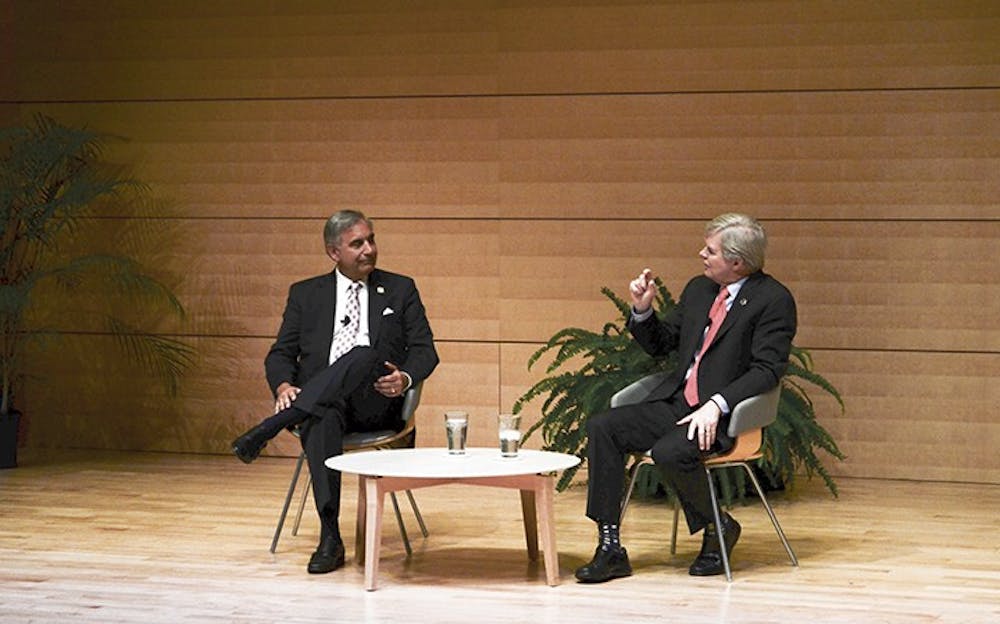University President Harris Pastides hosted NCAA President Mark Emmert for his fifth annual President's Leadership Dialogue to talk leadership philosophies and the positive impact of sports on young leaders. The event was held on Thursday at the Darla Moore School of Business.
The two men discussed myriad topics, ranging from NCAA policies to the role of student-athletes on campus to the importance of diversity in leadership. They also addressed questions submitted by the audience.
The event began with a short address from Emmert himself, in which he discussed his experiences in the administrative side of higher education and how he came to develop his own leadership philosophy.
"The realities of leadership to me are much, much more about the day-to-day acts of leadership that we all have opportunities to engage in and the development of the habits of leadership over a long period of time and often a lifetime," Emmert said.
Pastides then joined Emmert on the stage to speak about many issues surrounding leadership within collegiate athletics and higher education in general.
Coming out of a year in which athletes at schools such as the University of Missouri served as key players in protests against institutional racism in colleges and universities, Emmert acknowledged the broad leadership responsibilities of student-athletes.
"It's one of the principles that the NCAA leadership is always pressing is student athletes to be engaged members of their campus community," Emmert said, "that they feel both a responsibility and an opportunity to be engaged in the civil discourse in that campus and the broader community."
Emmert also made clear his belief in the importance of diversity in leadership positions for multiple reasons.
"To [not have a diverse group] would be really stupid," Emmert said. "By that, I simply mean that there's X amount of people around to think for a moment that there's only a very small portion of these that I'm going to draw strength from is absurd ... It's just foolish to not take advantage of the talent that's out there ... when you bring a diverse group of people together, and not just racially or in terms of gender but in terms of background ... you just bring more skill together."
He used the example of the expansion of women in athletics as a prime example of the benefits of diversity.
Another topic was the struggle to create a balance between athletics, well-being and academics for student-athletes.
"There's a number of proposals floating around ... what everybody does want is to try and find a way where the student-athletes can take full advantage of all the opportunities that this great university and any other university has to offer," Emmert said. "[Student-athletes] want to have access to internships, they want to maybe take a quick study abroad, they want to be able to do some of the things they know are going to set them up for success later ... but finding the exact way to do that is going to be very hard."
When asked about how much time athletes should have to spend in college before advancing to professional leagues, especially the "one and done" rule in men's basketball, Emmert explained that while he and the NCAA support more mandatory years in school, that decision is made by the professional leagues and their player unions.
"The rules about when a student or a young person ... can enter a professional sport and governed by that professional sport," Emmert said. "it has nothing to do with the NCAA or the universities ... We routinely express our displeasure with the one-and-done model."
Following their dialogue, the pair responded to a series of questions submitted by audience members via email and notecards handed out at the event. One topic addressed was the issue of disciplinary actions imposed on teams that are frequently criticized as hurting athletes who had nothing to do with the violations rather than the actual perpetrators.
"We need a penalty structure that doesn't punish the innocent but punishes the guilty," Emmert said. "One of the hardest things about that is that the committee and the association members want a deterrent that encourages the entire university to be vigilant ... and post-season bans are seen as one of the most effective things for doing that."
Later in the evening, Emmert also attended the Gamecock women's basketball match-up alongside Pastides.

